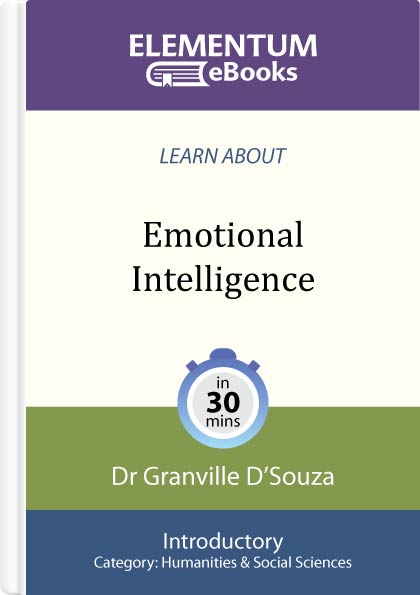
$3
Emotional Intelligence is the ability to understand emotions within yourself, read it accurately in others, process the wisdom within it, and apply it effectively for ourselves and with others.
Emotional Intelligence(EI) and Emotional Quotient(EQ) are often used interchangeably, but they are not. It’s much more accurate to think of EQ as a measurement of EI, just as IQ is a measurement
of cognitive intelligence. (And just as there are different IQ tests, there are different EQ tests.)
Learn About Emotional Intelligence in 30 Minutes:
1.Teaches you the meaning, characteristics, background, and some measurement models of Emotional Intelligence (EQ).
2.Presents a model of EQ based on observable and measurable behavioral competencies.
3.Shows the importance of being in touch with your emotions so as to reduce stress, increase peace of mind and happiness, and increase resilience and motivation.
Characteristics of EQ
In 1992, Daniel Goleman, a science writer specializing in brain and behavior research and working for the New York Times, was preparing to write a book on emotional literacy when he found the original article by Salovey and Mayer. Goleman contacted the two professors and received their permission to use the term ‘Emotional Intelligence’.
While Goleman used the initial research done by the two professors, he did a great amount of additional research to expand on what they had written. In his book, Emotional Intelligence, Goleman shows a strong correlation between being able to live a healthy and successful life and having the ability to identify and deal with emotions.
In fact, he pinpointed five traits that have been shown to predict success (both personal and business) — even more than high IQ (Intelligence quotient). These characteristics have been identified as the foundation of EQ:
1. Self-awareness: Being aware of our own emotions, strengths, and limits; knowing our own self-worth and capabilities.
2. Mood Management (also called ‘self-regulation’): being able to regulate our emotions, especially the painful ones, and making conscious decisions around them instead of letting our emotions control us. It also includes being willing to be
responsible for our own actions, as well as action open to new ideas and information.
3. Motivation: Having ambition and drive, being able to take initiative, be optimistic and persistent, and make a commitment to be successful.
4. Empathy: Being able to sense, care about, and influence other people’s feelings and emotions.
5. Social Skills: Having the ability and willingness to create and sustain interpersonal relationships.
Granville is the CEO & Founder of EQ World PteLtd (www.eqworld.com), a consulting and trainingpractice specializing in organizational behavior and performance.
For the last 25 years, Granville has been helping employees in organizations to learn about their strengths and weaknesses through coaching and workshops that deal with team and individual behavior.
The group designs and facilitates corporate and individual workshops that focus on enhancing performance in the workplace and personal life.
These workshops include dealing with change, forging powerful partnerships in organizations, and building individual resilience and team resilience.
In addition, Granville does developmental coaching that deals with deeper emotional issues resulting from past programming. These include trauma, loss of motivation, loss of direction, self-sabotage, anger and mild depression, phobias, and acute fears.
His workshops and coaching are used to boost performance of people at all levels and for teams to approach obstacles objectively with a view to enhancing group performance.
Granville’s programs touch on a wide range of topics: Leadership, Performance Coaching, Energy Psychology, Emotional Intelligence, Resilience, Personality and Behavior Profiling, Coaching with EFT(Emotional Freedom Technique), etc.
He uses various instrumentsm such as DISC, Harrison Innerview, Enneagram, MBTI, SEI, Baron’s EQ-I, and EQCP in his training/coaching practice to help participants understand innate behavior and those within their influence to take action. His 3-month coaching program employs techniques from Psycho Cybernetics to help his clients build their self-image and self-belief for breakthrough results.
Granville has written 3 books: EQ From the Inside Out, Unshakeable Spirit, and EQ for Success & High Performance. He has authored numerous articles for several HR magazines and is the co-creator of the EQ Coach cards.
He was the Regional Director of Six Seconds from 2003 till 2012 when he decided to start his own EQ brand.
Granville has a Bachelor of Arts, an MBA, and adoctorate in Business Administration from the University of South Australia.